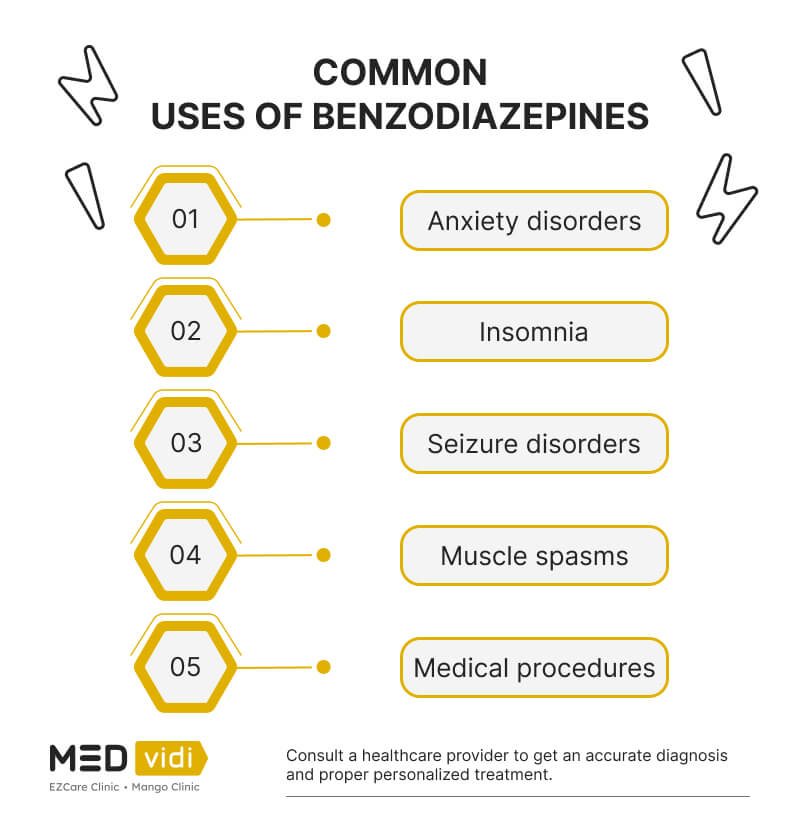Benzodiazepines have been a subject of both medical utility and public concern for several decades. According to the Centers for Disease Control and Prevention (CDC), in 2019 alone, around 92 million prescriptions for benzodiazepines were filled in the United States. However, their widespread use also comes with some risks, including dependence and various side effects.
The balance between potential benefits and pitfalls of benzodiazepines makes them a critical subject for discussion. Read on to find out common benzodiazepines types and uses as well as the associated risks.
What Are Benzodiazepines?
Benzodiazepines, also commonly referred to as “benzos,” are a class of psychoactive drugs that act on the central nervous system. They produce a range of effects, including reduced anxiety, sedation, and relaxation. While benzodiazepines can be effective for short-term treatment of specific conditions, including anxiety, insomnia and seizures, they are generally not recommended for long-term therapy due to the potential for dependence, tolerance, and other adverse side effects.
Types of Benzodiazepines
Benzodiazepines come in various forms and have different
- Short-acting: examples include triazolam (
Halcion[2] ) and alprazolam (Xanax). These are usually prescribed for insomnia and anxiety symptoms. - Intermediate-acting: examples are clonazepam (
Klonopin[3] ) and lorazepam (Ativan[4] ). They are often used for a slightly extended relief from anxiety and panic disorders. - Long-acting: examples include diazepam (
Valium[5] ) and chlordiazepoxide (Librium[6] ). These are commonly used for treating anxiety disorders, muscle spasms, and sometimes for alcohol withdrawal symptoms.
What Are Benzodiazepines Used for?
Benzodiazepines have anti-anxiety, sleep-inducing, anticonvulsant, and muscle relaxant properties. Therefore, they are typically prescribed for the following conditions:
- Anxiety disorders. Benzodiazepines are most commonly prescribed for anxiety disorders, including generalized anxiety disorder (GAD), social anxiety disorder, and panic disorder. They can provide quick relief from acute symptoms but are generally not recommended for long-term anxiety treatment.
- Insomnia. Some benzodiazepines are effective in treating insomnia, particularly when the condition is acute and short-term. They help decrease the time it takes to fall asleep and increase the duration and quality of sleep.
- Seizure disorders. Certain benzodiazepines are used as anticonvulsants in the treatment of seizure disorders like epilepsy. However, they are typically considered secondary options to other antiepileptic drugs.
- Muscle spasms. Benzodiazepines can relieve muscle spasms and tension, often in conditions like spasticity or various forms of dystonia.
- Medical procedures. Some benzodiazepines are used in medical procedures that require sedation or relief from anxiety and discomfort. They are commonly used in dental surgeries, minor surgical procedures, or diagnostic tests like endoscopies.
- Other uses. In some cases, benzodiazepines are used in the
treatment of alcohol withdrawal symptoms[7] and conditions related to substance abuse.
For those experiencing both anxiety and depression, benzodiazepines might be considered as a part of a broader depression treatment plan, albeit with caution due to their potential for abuse.
How Do Benzodiazepines Work?
Benzodiazepines
Advantages of Benzodiazepines
While benzodiazepines have their risks, which include dependence, tolerance, and potential for abuse, they also offer several key advantages:
- Relatively rapid onset of action. Some benzodiazepines can provide relief from acute symptoms (like severe anxiety or panic attacks) quicker than other medications. Note that the timing may vary in different patients, and it’s important not to take additional doses if the first dose hasn’t provided the desired effect quickly.
- Flexibility in duration of action. There are short-acting and long-acting benzodiazepines, which allows for tailored treatment plans. For example, short-acting benzodiazepines may be preferred for insomnia.
- Versatility. Prescribed benzodiazepines can be used beyond treating anxiety and sleep disorders. They are used in the management of alcohol withdrawal, as muscle relaxants, and for sedation during certain medical procedures.
- Availability in different forms. There are oral benzodiazepines in tablets, injectables, and nasal sprays or under-the-tongue formulations, allowing for flexibility in administration.
- Relatively safe in overdose. While overdose is a serious concern with any medication, benzodiazepines are generally safer than other sedatives like barbiturates. However, this does not eliminate the risk of benzodiazepine overdose, especially when combined with other central nervous system depressants like alcohol or opioids.

Side Effects of Benzodiazepines
While benzodiazepines can be highly effective, it is important to be aware of the potential side effects that may accompany their use. These side effects can vary in severity and frequency, and it is crucial to consult a healthcare provider for personalized medical advice. Below are some of the
Common side effects | Serious side effects |
|
|
Benzodiazepine Medication Overdose
An
- Extreme drowsiness or sedation.
- Confusion and impaired coordination.
- Slurred speech.
- Extremely slow or shallow breathing.
- Coma or unresponsiveness.
Risk factors:
- Taking higher doses than prescribed.
- Mixing benzodiazepines with other substances, particularly alcohol or opioids.
- Long-term use of benzodiazepines.
In case of overdose, immediate medical attention is crucial. If an overdose is suspected, call emergency services or go to the nearest emergency room as quickly as possible.
Benzodiazepine Dependence and Tolerance
Benzodiazepine dependence can occur with long-term use, leading to both psychological and physical dependence on the medication. If the medication is abruptly stopped, withdrawal symptoms such as exacerbated anxiety, insomnia, and in severe cases, seizures, may occur.
The best way to manage benzodiazepine dependence and tolerance is through medical supervision. Your healthcare provider may recommend a slow tapering schedule to reduce the dosage safely.
Benzodiazepine Misuse
According to research, misuse happens in 20% cases of benzodiazepine uses and can take several forms:
- Taking medication without a prescription.
- Using it in a way other than prescribed (e.g., higher doses, crushing pills, mixing with other substances).
- Using it for recreational purposes to achieve a “high.”
Misuse can lead to a range of negative consequences, including overdose, dependence, and a host of mental and physical health problems.
When a Patient Can Be Prescribed Benzodiazepines
Benzodiazepines are most commonly prescribed for anxiety disorders, insomnia, seizures, and muscle spasms. In some cases, they are used for short-term relief from acute stress or as a premedication for medical procedures. However, due to the potential for dependence, these medications are generally not recommended for long-term treatment of chronic conditions.
Doctors consider a variety of factors before prescribing benzodiazepines, including your medical history, the severity of your condition, and other medications you may be taking. They may opt for alternative treatments, including other drugs, such as SSRIs for anxiety disorders or cognitive-behavioral therapy for insomnia, particularly for long-term management.
Benzodiazepines During Pregnancy and Breastfeeding
The use of benzodiazepines during
Breastfeeding mothers also need to exercise caution, as benzodiazepines are excreted in breast milk and can affect the nursing infant. In both scenarios, it is essential to consult with a healthcare provider for a personalized risk assessment and to explore alternative treatment options.
Taking Benzodiazepines With Other Medication
When taking benzodiazepines, consider potential drug interactions with other medications, including:
- Opioids.
Combining benzodiazepines with opioids[13] can lead to severe respiratory depression. - Antidepressants. Some antidepressants can interact with benzodiazepines, altering their effectiveness or increasing side effects.
- Alcohol. Never mix benzodiazepines with alcohol as this can lead to extreme sedation and even respiratory failure.
It’s crucial to provide your healthcare provider with a comprehensive list of all medications you are taking, including over-the-counter drugs and herbal supplements. This information will enable them to make a more informed decision regarding the safety and the efficacy of adding prescription benzodiazepines to your treatment plan.
Conclusion
Benzodiazepines offer a potent solution for a range of medical issues such as anxiety, insomnia, etc. But their effectiveness is counterbalanced by risks including side effects, dependence, and the potential for overdose. Special care is essential in scenarios like pregnancy or when benzodiazepines are taken alongside other medications. Therefore, benzodiazepine drugs are generally best employed for short-term treatment and should be administered under close medical supervision.
Contact MEDvidi today, and our medical experts will assess your symptoms and create a treatment plan. You can also receive guidance on lifestyle adjustments and other treatments to enhance your well-being.
FAQ
What symptoms require benzodiazepines?
Benzodiazepines are commonly prescribed for symptoms related to anxiety disorders, panic attacks, insomnia, and sometimes for seizures or muscle spasms. They may also be used in medical procedures requiring sedation.
Who uses benzodiazepines the most?
Benzodiazepines are most commonly prescribed to individuals with anxiety disorders, insomnia, and certain seizure disorders. However, their usage can vary by demographic, and in the U.S., older adults may have
What are the reasons I should not take benzodiazepines?
You should avoid benzodiazepines if you have a history of substance abuse, are pregnant or breastfeeding, or have certain medical conditions like severe respiratory issues. These medications can also interact with other drugs and alcohol, leading to dangerous side effects.
What can I not eat or drink if I’m taking benzodiazepines?
While taking benzodiazepines, it’s generally advised to avoid alcohol and grapefruit or grapefruit juice, as these can interact with the medication and increase the risk of adverse effects, such as extreme drowsiness, impaired motor function, or respiratory depression. Always consult your healthcare provider for personalized guidance.
How long can I stay on benzodiazepines?
The duration for which one can stay on benzodiazepines varies by individual and the condition being treated. Typically, they are prescribed for short-term use (a few weeks to a few months) due to concerns about dependence and tolerance. However, some individuals might be on them longer under careful supervision. Always follow your healthcare provider’s recommendations regarding the duration of treatment.
Can I work or drive if I’m taking benzodiazepines?
Benzodiazepines can cause drowsiness, impaired coordination, and slowed reaction times. It is generally advised not to drive or operate heavy machinery until you know how these medications affect you. Similarly, they might affect your ability to perform certain tasks at work. Always consult with your healthcare provider and follow label warnings.












